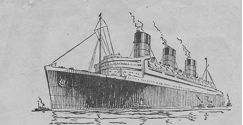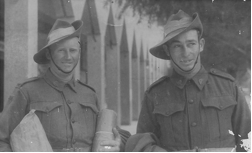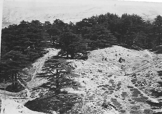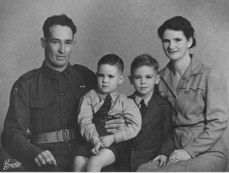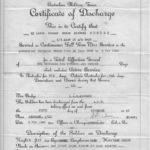Henry was finding the whole issue was getting on his nerves, but his spirit was buoyed when he received a letter from Marg. Because the Jap bombers had appeared over Townsville, the Waughs decided it was time to move South. Marg, the boys, her sister Queenie, and Mr and Mrs Waugh travelled by train to Brisbane to a rented house in Clayfield. He noted in his diary and on his records a change of address and his mind was able to concentrate on the issues of the time.
The Regiment returned to base camp in Palestine still only partially trained and only 12 Battery had actually fired their guns. “Hey, there’s a Revue on this week!” Jack told his drivers. “Anything to overcome this boredom,” said Jim, “and I hear we’re going somewhere else.” “I heard it was Libya,” Arch responded. “Bull,” Jack replied,”the Germans are too thick there.” “Anywhere would be better than Palestine!” Rich said. But the real battles in the desert were not going well for the Allied troops who suffered a number of setbacks. The Ninth Division was the only complete and rested troops available if things got worse.
On the First of July, 1942 Jack called his drivers together and announced, “We are to move to Egypt,” he told them, “to defend Cairo from the Huns’ bombers.” “Are the Egyptians like these wogs here?” Barney asked. “No,” Lofty responded, ”they’re all like Cleopatra. Haven’t you seen them movies?” “Will we see the pyramids?” Henry asked. “I don’t bloody know,” Jack said, “just get ready to move at 1400 hours.” They moved off at the ordered time and after five hours driving they arrived at Bir Asluj where they camped for the night. “Come on, wake up you buggers,” Jack said trying to rouse the cold and tired drivers. By ten o’clock they were crossing the Sinai Desert and about fifty miles from Ismalia they again camped for the night. Jack had ordered an early start, so at 6am they were on the way again and drove into Ismalia around ten thirty. “Refuelling time!” was the word that came down the convoy as each of the trucks was filled for the next drive across the Suez Canal. They crossed the Canal and spent the night on the Tantra by-pass road. By July 5 they reached camp at Amiriya to join the other Batteries. It was now obvious to all that they were a long way West of Cairo. Unknown to most the orders had changed and the 2/4th was now to defend Alexandria.
The drive from Cairo to Alexandria was unforgettable. “Bloody hell!” Rich exclaimed,” as the convoy found a continuous flow of traffic in the other direction. “How bloody long is this bloody group,” Henry asked as for hour after hour the traffic streamed back towards Cairo. “You’re going the wrong way,” the other troops called. But 11 Battery’s orders were to head west. The retreating troops were orderly but much of their equipment was damaged. “Look at that Bofors,” Henry exclaimed, as a severely damaged gun trundled past. By now all of the boys realized that training was over and they were about to enter a new phase of their time in the Middle East.
“Our luck’s in!” Jack told them, “We’re the ‘Reserve Group’ to defend the city while the others are heading out to the west and south-west of the city.” The boys were excited that action was imminent, but word filtered back of casualties among the other batteries and enemy aircraft began to become a daily occurrence. It seemed the Germans were holding on to strategic positions and using dive bombers and strafing aircraft against the Allied forces. Henry was increasingly concerned that sooner or later they would be ordered to move forward for an attack on Rommel’s Afrika Corp. Orders came for an attack on Tel El Eisa and part of 11 Battery was to support the infantry to move forward. The attack faltered and the Germans mounted a furious counter attack. The Bofors found themselves firing constantly at Stuka dive bombers. “Here comes another one!” Henry shouted as he sheltered under his truck. “Got you, you bastard!” the gunners yelled as a JU88 was hit and was seen disappearing but loosing height. Henry was excited but frightened and each time a dive-bomber came over he silently prayed. He wasn’t a religious man, but in the circumstances it seemed the only thing to do.
They had failed to take the Tel El Eisa ridge, and on the 21st of July the guns were attached to their tractors and withdrawn to a rear bivouac area. It was 9pm and Henry and his mates were glad of the darkness. Throughout the rest of July the Batteries moved forwards and backwards in support of attacks and withdrawals and casualties increased. Then there were ‘wog’ sores, and dysentery as the men endured harsh desert conditions from hastily dug latrines and flies. Although the front was at last stable there was a major change of command. Montgomery was appointed to command the Eight Army. “I’ve heard of him,” Jim declared, “Bloody good general.” Henry was less sure because he had seen so much indecisive action that he was convinced none of them knew what they were doing.
August bought little change, with the guns in position and very little movement. This meant the drivers had little to do and although each of the Battery Troops was now a cohesive and friendly group there were still problems. For the infantry there was a lull in the fighting but for the anti-aircraft gunners the planes kept coming. As bombs whistled down, and shrapnel scattered among the guns and trucks Henry and his mates dived for cover. “That was close,” Ron whispered. Henry turned around to find his truck badly damaged. An important lesson was learnt and from then on the trucks were sandbagged when possible. “Got to go!” Pete said anxiously, as he raced for the latrine. Dysentery was rampant but the latrines were not the best place to be when enemy aircraft were about. The men felt more and more like animals. “Bloody rabbits,” Rich said, referring to the holes they lived in most of the time. “They’ve sent Fred back, battle fatigue,” Jack announced. “But listen boys, I know things are tough but we are here to do a job and that’s what we’ll do!”
Jack then announced that a small ration of beer was available, “But it’s bloody Canadian Black Horse – tastes like shit!” Lofty shouted, “Can’t we have some real Aussie beer?” The strain of constant air attack, desert heat and dust, flies and septic sores was telling on the boys. Henry took refuge in writing letters home. Leslie would be two years old soon but Marg was coping according to her letters. She wrote to Henry that there was a large American army camp just down the road from the Clayfield house, Kalinga Park, and the Waughs made some of these Americans welcome as visitors to their home. Henry wished he was back home and every letter he wrote told of his anxiety. He would be twenty –eight in a few months and instead of leading an idyllic life among the cane fields of North Queensland he was stuck in this dry, dusty, windy, hot desert in North Africa. At night he would dream of the future when he and his boys could do all those things fathers did with sons – play cricket, go camping and make billy tea – but sleep was often short as the sirens would sound.
By the end of August the German attacks had slowed and there was an uneasy quietness. At times the Salvos came to ease the waiting. ‘Fags’ were the most popular item as everyone smoked incessantly but sometimes it was a book or magazine. The Comfort Fund sent cakes and biscuits and they were usually stale but anything was better than the food the army was expecting the men to eat. Henry loved fresh vegetables and dreamt of the time when he got home and could grow silver beet, carrots and cabbages and plant fruit trees. He would spend hours talking to Rich and the others who were farmers in civilian life even though they came from States where the climate was totally different form Ayr’s. He would tell them about cane fires and cutting cane by hand. “That’s how I lost the top of my finger,” he told them, holding up his right hand. Rich talked about wheat fields and rabbits in South Australia where he came from. Anything was better than talking or thinking about the war they were supposed to be fighting.
During September it became obvious that there were plans afoot for an attack against the Germans and the guns were frequently moved in support of other Regiments as they readied themselves for an offensive. The Stukas and Messerschmidts continued to attack but there were few casualties. The main problem was illness but Henry and his mates managed to avoid the infective jaundice and heard some good news. “The Regimental Trust Fund has decided to give us some relaxation!” Jack told them. “The YMCA Corporal has got a radio and will come to us so you can listen for a while.” Meanwhile the Fund had obtained books for a library and the Padre had a gramophone for the Batteries to borrow. “Great,” Jim said, “some music is just what we need.” “Decent food might have been better,” Henry replied. Morale was improving and then even better news was announced. Not only was a concert party coming but some of the boys were to be given leave. “Four days leave in Cairo,” Jack announced but to some this was telling them that they were going to be here in this hell hole for a long time yet.
The Germans meanwhile were engaging in a psychological war against the troops. “Hey! Look at this,” Ron shouted as papers floated down from above. The Germans had dropped leaflets which said, “You are defending El Alamein box, what about Port Darwin?” The leaflets had Boomerang or Platypus insignia on them designed to make the Aussies homesick. Another leaflet worried Henry as it said,”The Yanks are having a good time in Aussie, what about you?” He thought of Marg’s letter telling him of the Yanks visiting but dismissed any further thoughts of hanky panky as he trusted Marg implicitly. But the Germans thought that, for many, doubts would be raised. They were wrong. Most of the Aussies laughed at the leaflets and pocketed them as souvenirs. All the battery knowalls were now convinced that ‘something’ was coming but they were unaware that the Eight Army Commanders had by now drafted battle instructions for what was to become one of the greatest battles of World War 2.
October was a month of preparation. 11 Battery was at first to be held in defence mode but late in the month they were given a rousing speech by Montgomery. It was relayed via a pamphlet to the boys. “I told you Monty would let us know what’s going on!” Pete said. They were told that at between 2200 and 2300 hours on the night of the 23rd the battle would begin. Henry’s group was to be ready to protect artillery and infantry and move forward as the attack progressed and on the night of the 22nd in darkness the trucks were readied and, in convoy, prepared to move. “Get those trucks going,” Jack called. The guns and tractors were first followed by the support trucks. Gears crunched, motors revved, and the excitement grew as they moved slowly forward. “At last,” Henry thought, “we will send those bastards back to Germany!” Through the dusty darkness, lights out and in silence the convoy headed into the desert.
Next day after an uncomfortable night camouflaged and dug in or sleeping under their trucks 11 Battery got ready for what was to come. Henry’s truck refused to restart after an afternoon stop and Jack ordered the others to move around it and keep moving. Henry was left to find the problem and fix it. “Damn,” he muttered, ”Just my luck.” It was getting late and with his head buried deep under the bonnet Henry struggled to find the problem. “This bloody dust and heat,” he said, more to himself than anyone else. By darkness he had the truck going but was way behind his convoy. Travelling in a pitch black night made his task more difficult as he tried to find 11 Battery.
Henry looked at his watch. It was a around 9.40pm and he stopped the truck in the darkness. Suddenly his ears were blasted by the biggest artillery barrage ever launched. The noise was almost unbearable and Henry’s thoughts turned to home. Would he survive this battle, would he see his wife and boys again? “Hell this noise is deafening!” For fifteen minutes the barrage continued and then sudden silence. “Is that it?” Henry wondered. He started the truck up and headed off again. After about five minutes the guns opened up again in a creeping barrage as the infantry advanced and he finally found his Troop and spent the day advancing the Bofors to protect the troops and armour from air attack. This was the battle of El Alamein and the next day, the 25th, was his 28th birthday.
The next weeks brought sleepless nights as the German planes strafed and bombed the advancing Allies. The Bofors fired constantly as wave after wave of dive bombers attacked. 11 Battery tasted success as a plane plummeted in flames and smoke. “Got one! Nazi bastard!” one Gunner shouted as the German plane disappeared over the horizon in flames. Jack kept his drivers busy as the battle lines advanced. By the first week of November the fight was almost over. 11 Battery found itself in German territory, now littered with destroyed tanks, trucks, guns and soldiers’ kit. The flies and stench were almost unbearable in the heat. “Must be dead Jerries buried somewhere here,” Barney observed as the boys picked through the equipment for souvenirs. “Hey!” Rich shouted, “Look at this!” and he held up an Italian Beretta pistol. “This one’s for me!”
The RAF by now controlled the skies and there was little to do for the anti-aircraft guns. Rumours were rife. “We’re going to Tobruk!” was the most common one but again it proved wrong. December arrived and the Regiment instead moved back to Palestine to Camp El Bureij. “Back to the wogs and sand and dust,” Jim exclaimed. It was a time for reflection. Some of their comrades had been killed, some injured, all had been deeply affected and they were still so far away from home. Leave in Cairo was given to some while the other prepared for what became obvious. They would be spending another Christmas in bloody Palestine!
On December 22nd the 9th Division assembled on ceremonial parade. Ten thousand men with bayonets fixed advanced in review order and the Last Post was sounded. General Alexander, the General Officer Commanding Middle East addressed the gathering in an emotional speech congratulating them on their bravery and commitment. A copy of the speech was given to every man and Henry neatly folded his and placed it in his diary to take home for his sons to read. Another Christmas came, better than the last with Comfort Fund parcels, plenty of beer and a great Christmas dinner and Henry posted a Regimental Christmas card home. All day thoughts were on the future. Rumours were again raging. They varied from the Regiment going on to Greece and Europe to the one they all hoped for – a return to Aussie.
New Year came and on the 3rd January it was confirmed that the 2/4 LAA Regiment was returning to Australia. The men were elated and that day all guns and tractors, trucks and equipment were returned to Ordnance. Preparations began for the journey home. All the men were issued with new uniforms, the first new clothes they had been given in over a year. Henry was delighted to be heading home where he would see his sons. Robert was now almost four and Leslie a little over two years old.



